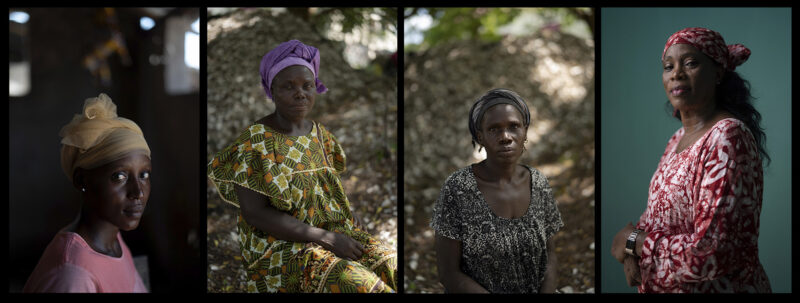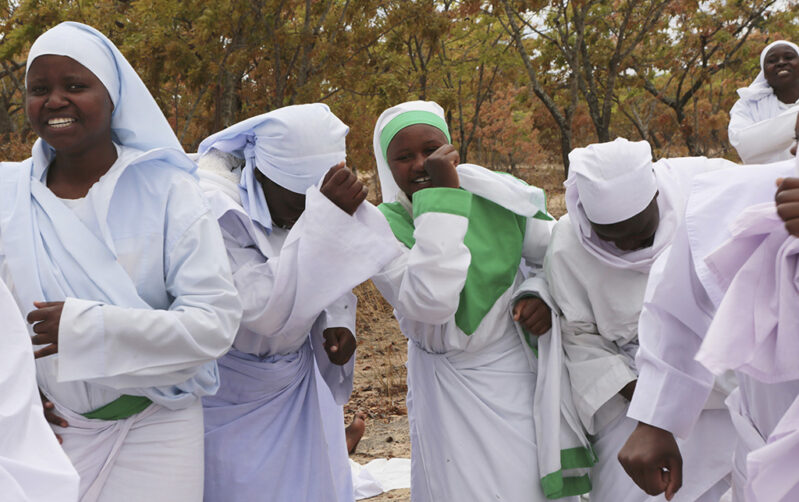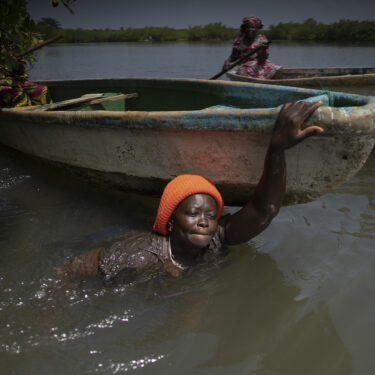Two distinctive packages from Africa examine vaccine hesitancy and gender inequality in the pandemic response on the continent — bolstering AP’s strong record of reporting on global inequity during the coronavirus outbreak.
Teamwork and deep reporting from Gambia resulted in a visually stunning package that revealed Africa’s women as being the least vaccinated population in the world and explained why, bringing readers and viewers into the women’s lives.
London-based medical writer Maria Cheng wanted to know why women in some African countries were receiving far fewer vaccines than men. Looking at government data she found numerous poorer countries where women were clearly lagging behind on vaccinations. She turned to AP’s Dakar, Senegal-based team for help in answering the important question of why, and to bring life to the numbers.
West Africa bureau chief Krista Larson,senior producer Yesica Fisch and photographer Leo Correa traveled to Gambia where they set out to meet women wherever they could: at maternity clinics,at river crossings,near village wells,selling food on the streets at night.
The team first focused on an oyster and fishing collective to better understand the women’s precarious financial position and why that makes them hesitant to get vaccinated. The team spent sunrise to sunset with these women for several days in an effort to capture their daily lives,with Correa and Yisch spending hours submerged in water up to their shoulders as they make photos and video of the women swimming to their fishing nets in the mangroves.
Not wanting to focus exclusively on life near the capital,the team also trekked into Gambia’s interior,navigating 19 different police checkpoints over a 270-kilometer (170 mile) drive. They gained the trust of a nearby village chief who assembled his community to come talk to the AP about their fears and concerns around vaccination. What emerged was a powerful example of how social media can distort information and spread it to the most remote corners of the continent, even to areas where few own phones.

The stunning package,with editing by Janelle Cogan and remarkable digital presentation by Natalie Castañeda,was a leading example of AP’s commitment to covering global vaccine inequality as a major theme for 2021. Rather than statistics and analyst speculation, it featured the women’s own voices and striking portraits,underscoring the cultural pressures the women face and the power of misinformation. A sidebar by Cheng,with contributions from Bangladesh and Lebanon, expanded on the global scale of the problem and underscored the challenges to achieve gender parity in COVID-19 vaccinations.
The widely played work was flagged by public health sites,including Johns Hopkins and the Vaccine Confidence Project at the London School of Hygiene and Tropical Medicine, and experts reached out to the journalists thanking them for identifying this previously unreported trend.

Thousands of miles to the south, Zimbabwe stringer Farai Mutsaka and photographer Tsvangirayi Mukwazhi responded to a broad enquiry from the religion desk about whether churches in Africa were working to promote vaccines. They worked relentlessly to build trust with one of Zimbabwe’s leading churches — often mistrustful of the press — producing the first in-depth story from Africa on the subject.
The Apostolic Christian Church infuses traditional African beliefs into a Pentecostal doctrine and has a strong distrust of modern medicine. It is among the most skeptical churches in the country when it comes to COVID-19 vaccines.

Mukwazhi and Mutsaka made contacts and won the trust of a church leader who was speaking to various congregations,encouraging worshippers to get vaccinated. The AP pair,along with video journalist Pindai Dube,were permitted to cover an outdoor service where vaccinations were discussed, the congregants wrapped in white robes.
Africa Sports Correspondent Gerald Imray pitched in to polish the text with strong feeds from the U.S. and other points in Africa. The resulting package,compelling and sensitively reported, tenderly illustrated the dilemma confronting many Zimbabwean churches regarding COVID-19 vaccine hesitancy.




